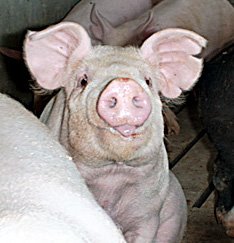 I have to disagree with Dr. Autumn Fiester1 (and also mattmills, or is it tomato boy, at the Sustainable Table Blog and Kevin at the Question Technology blog who seemed to agree with her).
I have to disagree with Dr. Autumn Fiester1 (and also mattmills, or is it tomato boy, at the Sustainable Table Blog and Kevin at the Question Technology blog who seemed to agree with her).Dr. Fiester was responding to recent news of a brood of cloned pigs whose DNA had been altered to contain a gene that can manufacture omega-3 fatty acids.
The original cloned-pig research, due in an upcoming issue of Nature Biotechnology:In her post How the Biotech Tail is Wagging the Pig Dr. Fiester said:
Generation of cloned transgenic pigs rich in omega-3 fatty acids
A NYTimes summary:
Cloned Pigs Could Provide Meat That Benefits the Heart
"... the one problem we don't have is a shortage of omega-3. Not only is it found naturally in readily available foods like walnuts and fish, but it can be found in supplements and nutritionally supplemented foods like Smart Balance Peanut Butter."I don't agree that "we don't have a shortage of omega-3". We do. Walnuts, flax seeds, and foods that contain flax seeds, e.g. Smart Balance Peanut Butter, provide the shorter-chain omega-3s2 (n-3s) which, as I've spoken about, must be converted in our bodies to the longer-chain variety3 before they reach their health-laden potential. Our bodies don't do a lot of that converting. Thus, we depend on eating the longer-chain variety of n-3s directly. Those longer-chain n-3s are found in animals, not plants4, that do the converting for us. Fish have a lot of longer-chain n-3s. But fish also have increasing levels of mercury, PCB's and other contaminants. Livestock have a little bit of n-3 naturally; they used to have more before we farmed them.
Elsewhere in her article she notes:
"The omega-3 pig represents the worst type of “research waste:” precious scientific resources of time, mental energy, and money that could be used to tackle serious human and environmental threats are being devoted to frivolous causes. The list of devastating problems begging for a scientific solution include: chronic, genetic, and infectious diseases ..."I don't understand her contradiction here. The chief advantage seen with consuming more n-3 (actually reducing the omega-6/omega-3 ratio) is the reduction in chronic diseases.
So, Contrary to Dr. Fiester, I believe we do have a shortage of n-3 in our diets. And, rather than poo-pooing it, I laud research that could result in livestock with higher levels of n-3. Research that could result in returning healthy levels of these fats to our animals is neither "frivolous" nor "research waste".
I don't however support genetic engineering as a means to that end. We already know that allowing an animal to pasture increases its levels of n-3 (and reduces the omega-6/omega-3 ratio). Let's research that.
2 Alpha-linolenic acid
3 EPA, DHA
4 There are a few rare exceptions.
Picture thanks to the Teaching Animal Unit at the NCSU Veterinary Medicine College.
No comments:
Post a Comment